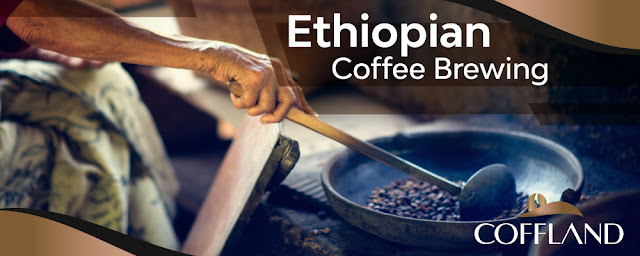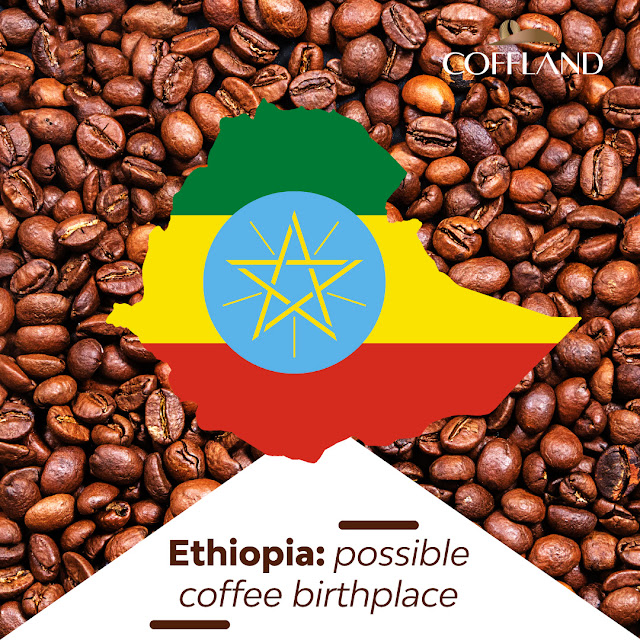 |
| In this African nation, the ritual we know as brewing has other cultural aspects. |
Coffee has been flowing over the cups over decades. And many countries claim to have unlocked the flavor of these beans. But the reality is that most experts agree on something: trailing back coffee, we can find its birthplace in the heart of Africa. More precisely, in Ethiopia. And today, you’ll know how this amazing culture marveled the world with these valuable beans. More than that: you’ll explore how the coffee brewing has become a tradition among Ethiopians. Get into the #CoffeeHistory with Coffland Corp!
Why Ethiopia?
If you’re a coffee lover, then you surely know that Ethiopian coffee it’s one of the best out there. And there’s a reason for that. Over its myths, a careful process ensures that each cup you get has the right amount of flavor. In fact, the most consumed strain of coffee (arabica) originated in this land, and while its farming has spread out to other latitudes, the most sought-after arabica seeds are Ethiopian.
The myth says that the origin of coffee began with goats. Yes, that’s right, you have to thank these animals for your brew! Legend says that a farmer saw his goats get energized after eating a certain fruit. He got curious and tried them himself, roasting them, and bam! Coffee was born. Although it has been experiencing interesting changes over and over since its discovery, goats involved or not, the root cause of the modern product can be found in Ethiopia. We’ve all been loving it ever since!
Coffee Ritual in Ethiopia
But what makes drinking coffee in Ethiopia an experience for coffee connoisseurs it’s the craft behind every single cup. Its native tribes and citizens have kept the tradition alive, creating a land of cultural enrichment behind the flavorful Ethiopian coffee. There’s a strong element of veneration and pride in this ceremony, and it’s not a simple ceremony, it can take up to two hours, so be aware that you’re in for the long run towards great flavors with it.
The traditional ceremony, Buna, it’s about union and peace. Families use it to resolve problems, to ask for marriage, and other important occasions in people’s lives. The first part is the roasting: ceremonially dressed, the woman in charge showcases the roast to its patrons. They will debate and consider the purity and quality of the beans; then it’s ground and infused.
This is done in a Jebena. This instrument, a clay container that creates the first cup of coffee: Abol. It’s the most powerful amongst all three. Most qualities of coffee can be perceived through this, and it’s one of the fundamentals of its consumption that represents the cause of the ceremony. It invites to resolve it, through dialogue and awareness of other people’s minds and feelings. It's also about respect for all those, but especially on behalf of the honored party.
Tona is the second cup, and it often comes with a salty appetizer, like seeds A bit diluted with water, represents communication and finding ways of solving the problem. Being a familiar dispute or a marriage request, this cup represents conversation. And just until the solution arises, with an agreement of all parts involved, is when you can really get the third cup. This means that as long as there’s not a solution, the woman in charge will not start to prepare the next step.
Baraka, it’s the third and final cup. It represents the resolution and the general agreement of all parties involved. It’s a softer coffee cup and represents joy and unity. It’s fundamentally a finalization of the issue and a clear showcase of community that characterizes Ethiopian communities. This ceremony is considered sacred, so be grateful and accepting when an Ethiopian invites you to it, as it’s equal to acceptance and welcoming you into their circle.
As you can see, coffee is not something that’s just prepared in a couple of minutes. Some cultures consider it part of their identity and identify with this event to showcase their heritage. Do you know some other ceremonies that are as profound as this when it comes to coffee? Let us know in the comments or share on social media using the #CofflandSocial hashtag!
 |
| While its origins are unknown, there's a good chance that coffee was born in this East African country. |
Facebook: CofflandCorp
Twitter: CofflandCorp
Instagram: CofflandCorp
Google+: CofflandCorp





No comments:
Post a Comment